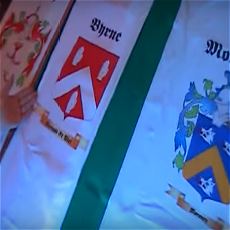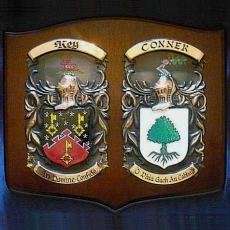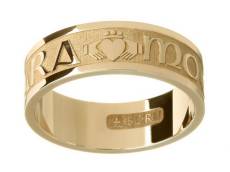IRELAND NEWSLETTER
MARCH 2017

IN THIS ISSUE
- News from Ireland
- Nemed - The Ruthless Invader of Ireland
- The Voice of the Bard by Jeremiah J. Shea
- 'The Fairies' Revenge' by Lady Wilde
- The O'Dempseys from Australia by Inagh Patricia Woods
- Gaelic Phrases of the Month
- Monthly Free Competition Result
Popular Articles from Recent Newsletters:


FOREWORD
Hi again from Ireland where this month we have some more stories of old Ireland. Read about the incredible Nemed - the ruthless invader of Ireland, a poem from Jeremiah J. Shea and the old story of the Fairies Revenge!
If you have a story or article you would like to contribute please do send it in.
Until next time,
Michael

P.S.
Please Do Forward this Newsletter to a
friend or relative. If you have a website or Facebook
page or Blog (or whatever!) then you can help
us out by putting a link on it to our website:
www.ireland-information.com
|

NEWS FROM IRELAND
PROPERTY BUBBLE AGAIN THREATENS IRISH ECONOMY
Recent reports by two independent Irish property websites have shown that the cost of housing in Ireland continues to surge.

Despite repeated assertions by Irish Government officials that no housing bubble is developing the path to disaster that is being followed at the moment is all too familiar.
The Central Bank regulations that were brought in to force buyers to have a minimum amount of equity in their prospective purchase have all but been scrapped.
Additionally, Government incentives for buyers seem to be ending up in the pockets of the property developers rather than driving down prices, which was their original intent. The Government had hoped that by empowering more buyers with the means to buy that developers would respond with lower prices, thus forcing the market downwards.
Of course the opposite has happened with house prices in Dublin climbing by over 6% in the last year alone. The average cost of a 3-bedroom semi-detached house in Dublin is now over 290,000 Euro (US$309,000).
This level of price increase puts the country firmly on the road to ruination as incredulous commentators observe the repeat of the mistakes of the past with the country following the 13 Step Plan for Ruination with ever increasing confidence/hubris.
PRESSURE GROWING ON CATHOLIC CHURCH TO COMPENSATE ITS VICTIMS
The redress scheme to compensate victims of clerical abuse that have been identified on foot of the Ryan Commission has so far cost over 1.5 Billion Euro. Of that amount some 6% has been contributed by the religious orders, despite a pledge that the cost would be shared equally.

The Missionary Oblates of Mary Immaculate is one of 18 institutions that were investigated and who eventually signed a much-criticized deal with the Fianna Fail Government of 2002. They have responded to recent remarks by T.D. Richard Bruton who said he was dismayed that the religious orders had not shared the cost of the financial redress equally.
The Missionary Oblates of Mary Immaculate have been quick to reply:
(there are)'legitimate grounds for having serious reservations about the findings, without impugning the central message of the report.'
The display of this level of disconnection is sure to cause further criticism of the religious orders, especially in the wake of the appalling revelations of the abuse of children at the Tuam Mother and Baby home recently. The Missionary Oblates of Mary Immaculate contends that comments by prominent politicians such as Richard Bruton amount to 'moral pressure' and should stop.
Richard Bruton is clearly unhappy with the situation:
'This means that even if all the offers currently on the table (from the religious orders) are delivered upon, the religious congregations will have funded 21.1% of the total cost of residential abuse, while the State will have funded 78.9%.'
The comments sections in the various Irish newspapers on this issue are revealing. One of the more restrained comments in the Irish Journal Newspaper summed up the mood:
'Moral challenge! Where were their morals when all this criminal abuse was going on?
Can they even hear themselves speak... Have they learned nothing. Shocking.'
UNITED IRELAND VOTE SEEMS UNLIKELY
One of the more unusual consequences of Brexit (the UK's decision to leave the European Union) are the calls for a vote on a United Ireland.
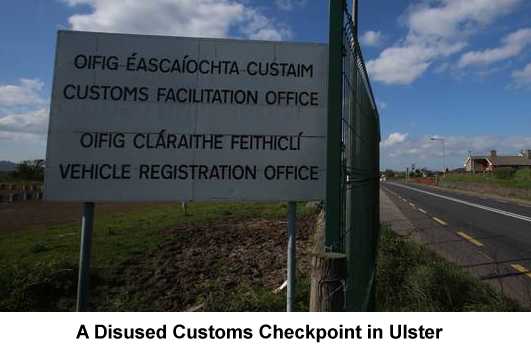
Any such 'border poll' would require a majority of residents of Northern Ireland to vote in its favour. Recent surveys have indicated that the Republican wish to have a United Ireland would fail dramatically as the combination of Unionists and the majority of Independents, Greens and immigrants would favour economic stability by remaining within the UK.
However the advent of Brexit is seen by many within Sinn Fein as a potential game-changer.
Given that the six Counties comprising Northern Ireland voted to remain within the EU (as did Scotland and Wales), the possibility of a vote on Irish unity in the North based on remaining within the EU is seen as one that may be attractive to moderates in Ulster.
At the moment though, this seems unlikely. However, if Scotland is granted its wish for a second independence referendum then it would be a lot harder to resist similar calls in Ulster.
UNEMPLOYMENT DOWN AGAIN
The downward trajectory being followed by the rate of unemployment in Ireland has continued so far in 2017 with the rate dropping a further 0.2% in March to 6.44%.
This represents a quite incredible reduction from the depths of the recession when the rate was well over 15% and climbing. Just 1 year ago the rate was 8.3%.
Emigration though has played a large part in these numbers with the effects of The Emigration Plan certainly being felt.
IRISH FOOTBALLERS WELL-PLACED TO QUALIFY FOR WORLD CUP IN RUSSIA
Ireland drew 0-0 with Wales at Landsdowne Road in an ill-tempered game that saw Irish defender Seamus Coleman suffer a broken leg after an horrific tackle by Neil Taylor. The Welshman was immediately shown a red card with the incident occurring just moments after the Welsh talisman Gareth Bale could easily have been sent off for a similar tackle on Irish defender John O'Shea.
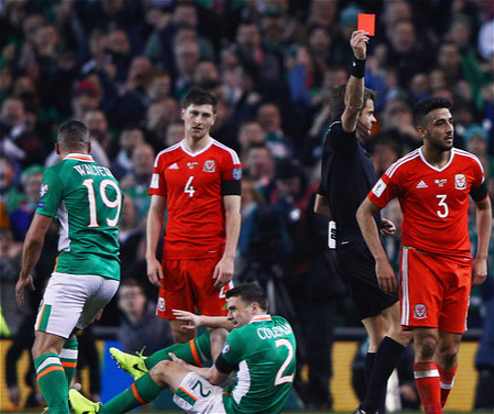
Despite playing with a extra man for the final ten minutes of the game the Irish team could not break down a resolute Welsh defence. Indeed the Welsh could have snatched victory themselves with Gareth Bale coming very close late on.
That would have been harsh though, with a draw perhaps the fairest result. The night will be remembered though for the horror tackle on Seamus Coleman, who looks set to be sidelined for at least six months.
Ireland are currently joint top of their qualifying group with Serbia, each team having 11 points. Wales and Austria follow with 7 points each at the half-way stage of fixtures, with 5 matches to play.
|

KEEP THIS NEWSLETTER ALIVE!
FIND YOUR NAME IN OUR
GALLERY OF IRISH COATS OF ARMS

|

NEMED - THE RUTHLESS INVADER OF IRELAND
Nemed was the leader of the third group of peoples to inhabit Ireland, before even the time of the Biblical flood.
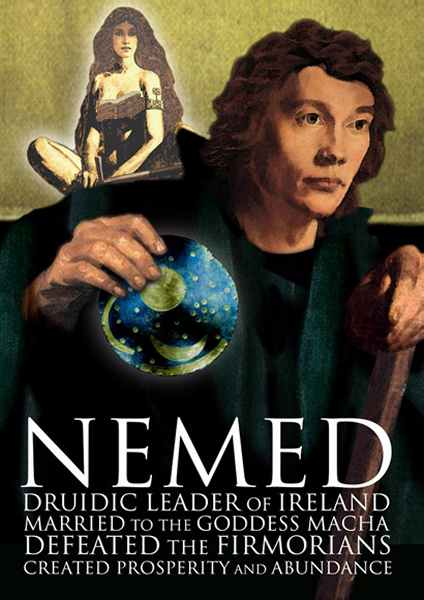
He is recorded in the eleventh century ancient manuscript 'Lebor Gabala Erenn', also known as the 'Book of Invasions', so called because it chronicled the arrival of the earliest people into Ireland. First were the people of Cesair, then the people of Partholon, then the people of Nemed, the mysterious Fir Bolg, then the supernatural Tuatha De Danann, and finally the Milesians who are the Gaels from which the modern people of Ireland are all descended.
Nemed (also known as Nimeth or Neimheadh) takes his name from the old Gaelic word 'nemed' meaning 'holy' or 'priveleged'. The book of invasions records that Nemed was of such an ancient lineage that his ancestry stretched back to the time of Noah of the Ark.
Nemed had set off on a voyage of discovery, seeking gold and riches in a vast fleet of 44 ships. Their voyage lasted over a year and a half by which time such was the toll of damage that only Nemed's own ship made ground safely. They had arrived in Ireland!
Nemed had arrived with his four sons and his wife Macha, who was to tragically die twelve years after their arrival, and who gave her name to the city and County of Armagh, ('Ard Mhacha' meaning 'Macha's high place').
The Nemedians immediately set about clearing the vast forests in Ireland, creating great plains and enormous lakes. Of course their arrival was greeted with hostility by the pirate Fomorioans who patrolled the waters around Ireland. Conflict was inevitable.
Battle after battle ensued before Nemed had an opportunity to show his ruthless streak. Having defeated the Fomorians he instructed four of that tribe to construct a fortress, and to do so in a single day. Amazingly they achieved the construction of Ráth Chindeich, a might fort, a feat which must have alerted Nemed to the possibility that they could repeat the task for any future possible rival.
Brutally, he had them killed instantly.
Nemed ultimately defeated the mysterious Fomorians who were thought to represent the darker, destructive evil aspects of nature: death, chaos, darkness, blight, starvation and drought.
And although the Nemedians thrived in the wake of their victory it was a force of nature, the plague, that would strike down Nemed and many of his followers and instigate the end of Nemedian influence in Ireland. Nemed was buried on the hill of Ard Nemid on Great Island in Cork Harbour.
The Fomorians regained control and exerted dire consequences on the last of the supporters of Nemed. At the end of every Summer (the feast of Samhain), they were required to offer up two thirds of their children, two thirds of their corn and two thirds of their milk to the Fomorians.
Eventually the Nemedians rallied and gathered for a rebellion, attacking the Fomorians with a force of 30,000 men by land and 30,000 by sea. They were initially victorious but ultimately defeated by the Fomorian leader named Morc, when a tidal wave engulfed their fleet, ending their presence in Ireland.
A single ship with thirty men escaped, some fleeing to the northern lands, some arriving in Britain.
Ireland would remain deserted for another two centuries.
Nemed will be remembered as a leader who brought prosperity to Ireland but who was also ruthless and had the ability to alter the physical landscape greatly if not to completely tame it.
It is perhaps fitting that a force of nature, the plague, rather than a force of man was to bring about his ultimate demise.

Fantastic Mother's Day Gifts from Ireland
find out more
|

The Voice of the Bard
By Jeremiah J. Shea (1903-1964)
Responding to an evening call
I asked the speaker's name in vain
He banteringly refused to tell
But fell into poetic strain.
In matchless meter I could hear
The lines that into verses fell
In cadence rhythmic as the note
That falls from distant vesper bell.
The timbre of the speaker's voice
Was resonant and full of thrill,
Awakening thoughts of vales that lie
Beneath the brows of Irish hills
Awakening long lost memories
Of boyhood days when I was free
To view the heather slopes that rise
In gentle sweep above Tralee.
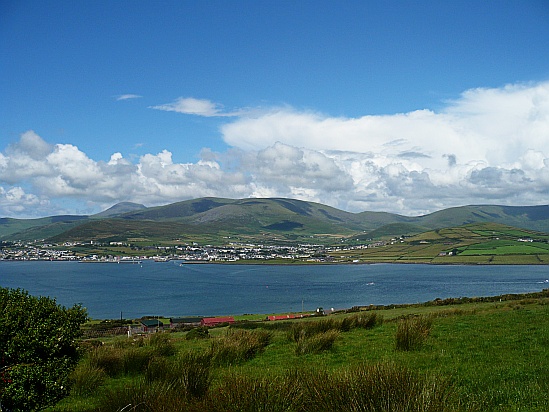
The heart within me soared away
To Dingle and Valentia Isle
Nor stopped until it had traversed
Full many glorious Irish mile
Around the reeks and westward ho
In fancy through the air I flew;
I paused to watch Mount Brandon bathe
Her feet in depths of ocean blue.
The voice of Conn the Irish bard
How could I miss the magic flow
Reaching as my wing tips spread
Above the gap of old Dunloe?
In summer dress she posed for me
Her face suffused in verdant mirth
The face of dear Dark Rosaleen
The sweetest, fairest land on earth.
Her ancient glory still lives on
Triumphant fluttered Erin's flag
Her beauty shone in hallowed gleam
From tower and turret peak and crag
The voice trailed off. I'd lived my dream
I'd lived it out until the end
I'd had my trip to Ireland free
From Conn the Irish bard, my friend.
|
|

|

THE FAIRIES' REVENGE
by Lady Wilde
The fairies have a great objection to the fairy raths, where they meet at night, being built upon by mortal man. A farmer called Johnstone, having plenty of money, bought some land, and chose a beautiful green spot to build a house on, the very spot the fairies loved best.
The neighbours warned him that it was a fairy rath; but he laughed and never minded (for he was from the north), and looked at such things as mere old-wives' tales. So he built the house and made it beautiful to live in; and no people in the country were so well off as the Johnstones, so that the people said the farmer must have found a pot of gold in the fairy rath.
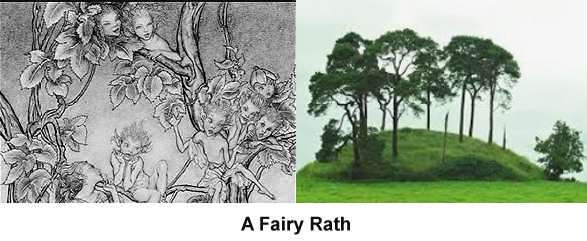 But the fairies were all the time plotting how they could punish the farmer for taking away their dancing ground, and for cutting down the hawthorn bush where they held their revels when the moon was full. And one day when the cows were milking, a little old woman in a blue cloak came to Mrs. Johnstone and asked her for a porringer of milk.
But the fairies were all the time plotting how they could punish the farmer for taking away their dancing ground, and for cutting down the hawthorn bush where they held their revels when the moon was full. And one day when the cows were milking, a little old woman in a blue cloak came to Mrs. Johnstone and asked her for a porringer of milk.
'Go away' said the mistress of the house,
'you shall have no milk from me. I'll have no tramps coming about my place'
And she told the farm servants to chase her away.
Some time after, the best and finest of the cows sickened and gave no milk, and lost her horns and teeth and finally died.
Then one day as Mrs. Johnstone was sitting spinning flax in the parlour, the same little woman in the blue cloak suddenly stood before her.
'Your maids are baking cakes in the kitchen' she said; 'give me some off the griddle to carry away with me.'
'Go out of this' cried the farmer's wife, angrily; 'you are a wicked old wretch, and have poisoned my best cow.' And she bade the farm servants drive her off with sticks.
Now the Johnstones had one only child; a beautiful bright boy, as strong as a young colt, and as full of life and merriment. But soon after this he began to grow queer and strange, and was disturbed in his sleep; for he said the fairies came round him at night and pinched and beat him, and some sat on his chest and he could neither breathe nor move. And they told him they would never leave him in peace unless he promised to give them a supper every night of a griddle cake and a porringer of milk. So to soothe the child the mother had these things laid every night on a table beside his bed, and in the morning they were gone.
But still the child pined away, and his eyes got a strange, wild look, as if he saw nothing near or around him, only something far, far away that troubled his spirit. And when they asked him what ailed him, he said the fairies carried him away to the hills every night, where he danced and danced with them till the morning, when they brought him hack and laid him again in his bed.
At last the farmer and his wife were at their wits' end from grief and despair, for the child was pining away before their eyes, and they could do nothing for him to help him. One night he cried out in great agony:
'Mother! mother! send for the priest to take away the fairies, for they are killing me; they are here on my chest, crushing me to death' and his eyes were wild with terror.
Now the farmer and his wife believed in no fairies, and in no priest, but to soothe the child they did as be asked and sent for the priest, who prayed over him and sprinkled him with holy water.
The poor little fellow seemed calmer as the priest prayed, and he said the fairies were leaving him and going away, and then he sank into a quiet sleep. But when be woke in the morning he told his parents that he had a beautiful dream and was walking in a lovely garden with the angels; and be knew it was heaven, and that he would be there before night, for the angels told him they would come for him.
Then they watched by the sick child all through the night, for they saw the fever was still on him, but hoped a change would come before morning; for he now slept quite calmly with a smile on his lips.
But just as the clock struck midnight he awoke and sat up, and when his mother put her arms round him weeping, be whispered to her—
'The angels are here, mother' and then he sank back, and so died.
Now after this calamity the farmer never held up his head. He ceased to mind his farm, and the crops went to ruin and the cattle died, and finally before a year and a day were over he was laid in the grave by the side of his little son; and the land passed into other hands, and as no one would live in the house it was pulled down. No one, either, would plant on the rath; so the grass grew again all over it, green and beautiful, and the fairies danced there once more in the moonlight as they used to do in the old time, free and happy; and thus the evil spell was broken for evermore.
But the people would have nothing to do with the childless mother, so she went away back to her own people, a brokenhearted, miserable woman—a warning to all who would arouse the vengeance of the fairies by interfering with their ancient rights and possessions and privileges.
|

|

THE O'DEMPSEYS FROM AUSTRALIA
by Inagh Patricia Woods
I am from the O'Dempsey line that came over from Ireland and settled in Queensland, Australia in the mid 1800s.
The original settler - James Patrick O'Dempsey - was going to be a priest in Ireland, but had to leave the seminary to help his mother when his father died. When he later married (in the Holy Cross church in Ireland) he and his wife Hannah O'Dwyer (he always called her Peggy) came out to Australia as a young married couple.
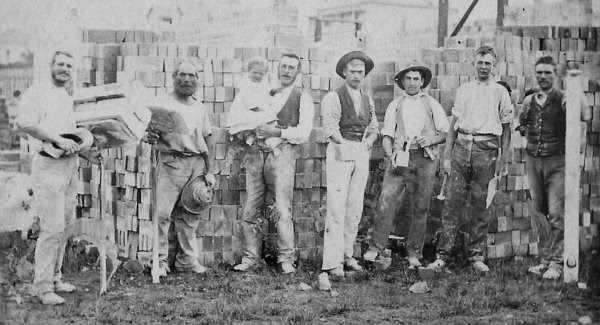
He spent the rest of his time here farming near Warwick in the state of Queensland - and fighting (on paper) the English authorities in this part of the world to establish a school for the Irish settlers here, along with other disagreements. He was highly educated you see and they couldn't down him. I think the word proud could definitely be applied to him. The British authorities used to refer to him as 'that troublesome Irishman'. But he got his school. And a private cemetery for the family. It's not used any more of course - no room - and sits all forlorn in the middle of a farm now owned by someone else. I always used to feel ridiculously proud that we had our own exclusive cemetery.
He insisted when landing in Australia on putting the 'O' back on the Dempsey name. This I believe had been removed by the British authorities in Ireland when they invaded the land of the green and tried to remove most of the Irish culture.
They had a lot of children, but most of his sons didn't marry. They were rather wild in their youth though, one in particular - with the ladies. There was many a time they say when he had to jump out a bedroom window to avoid being caught. He was actually shot once by an irate husband. When a woman asked a neighbour later where he'd been hit, she was given the reply:
'Missus, if you'd been shot where Billy O'Dempsey was shot, you wouldn't have been shot at all'.
My grandfather, Thomas O'Dempsey, did marry however - to a school teacher, Kathleen Cavanaugh, and had seven children. I'm said to look like her. I hope not!
She looked very haughty in her photograph when she was old - fierce eyes, ramrod back, no nonsense look on her face. He was a very gentle old fellow though and very tall. She probably bossed the hell out of him. They were farmers as well. I only remember him very vaguely from when I was young. He was impeccably dressed always in a white suit - my only memories of him. And a white hat and big white moustache.
Dad was Thomas O'Dempsey Junior (he married Mary McConville of another Irish clan) and he had two brothers, James and Jack. Jack caught polio as a young man, but was a school teacher as well. Jim I think worked on the railways. He married a young pregnant woman (not his). It was a happy marriage.
Dad was the runt of the litter really. His father and brother Jim towered over him, but Dad had the gift of the gab like you wouldn't believe. I loved to hear him talk. Even when he swore it sounded musical. To me, he always smelled like soap, cigarettes and love.
Carried me everywhere after I too got polio. Used to wrap me up under his overcoat and dance gently with me out under the stars at night while he sang with his lovely tenor voice all the old Irish ballads. Those cigarettes killed him. Way too young.
Mum and Dad had ten children. Six boys and four girls. I'm the second youngest of that large old clan. There's several thousand O'Dempseys now descended from the original James Patrick O'Dempsey and Hannah O'Dwyer.
I'm named after Inagh, a town in County Clare where Mum's mother was born - she was an Ellen Creedy or Cready. She came out here so young during a famine - out on a boat at the age of 11 in charge of the captain, to live with relatives, the poor little thing, and never went home again or saw her family - so sad. She could never bear to hear the song 'The Minstrel Boy'.
I think it made her heart ache.
Inagh Patricia Woods - nee O'Dempsey.
|

GAELIC PHRASES OF THE MONTH
| PHRASE: |
Beannachtai na Casca ort! |
| PRONOUNCED: |
bannockt/tee nah coss-kah urt |
| MEANING: |
Happy Easter! |
| PHRASE: |
Domhnach Casca/Luan Casca |
| PRONOUNCED: |
dow-nock coss-kah/loon coss-kah |
| MEANING: |
Easter Sunday/Easter Monday |
| PHRASE: |
Ubh Chasca |
| PRONOUNCED: |
uvv coss-kah |
| MEANING: |
Easter egg |
View the Archive of Irish Phrases here:
http://www.ireland-information.com/irishphrases.htm
|

COMPETITION RESULT
The winner was: staciearmstrong34@gmail.com
who will receive the following:
A Single Family Crest Print (US$24.99 value)
Send us an email to claim your print, and well done!
Remember that all subscribers to this newsletter are automatically entered into the competition every time.
I hope that you have enjoyed this issue!

by Michael Green,
Editor,
The Information about Ireland Site.
http://www.ireland-information.com Contact us
Google+
(C) Copyright - The Information about Ireland Site, 2017. P.O. Box 9142, Blackrock, County Dublin, Ireland Tel: 353 1 2893860
unsubscribe/disconnect from Ireland here
|

DONT LEAVE IT TOO LATE FOR ST. MOTHER'S DAY!










MADE IN IRELAND!
MARVELOUS GIFTS FOR ANY OCCASION
FREE DELIVERY TO YOUR DOOR
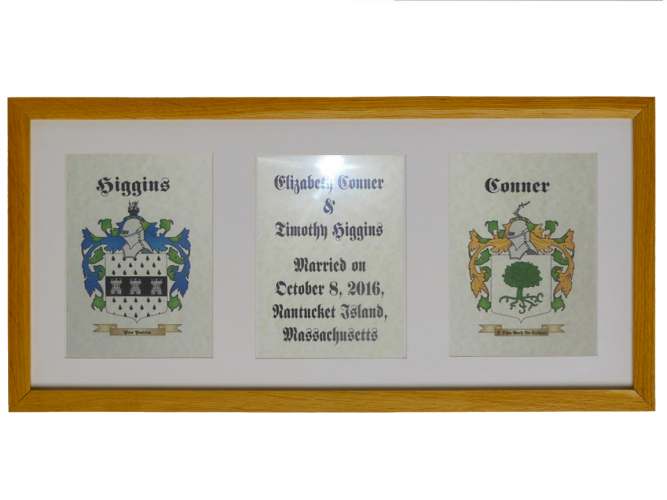
Meaningful Wedding or Anniversary Gift

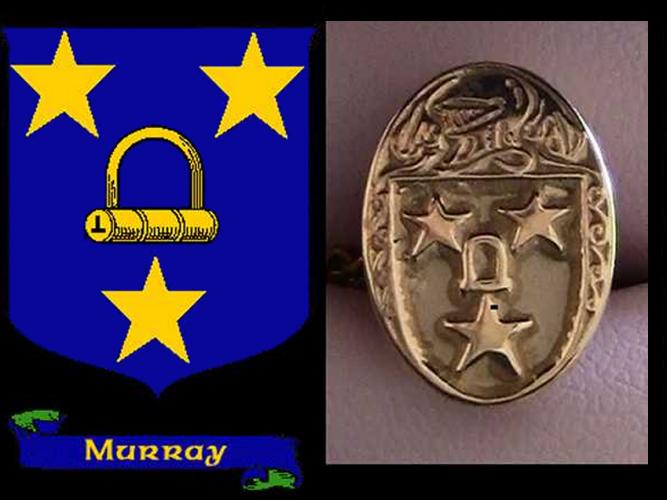
Gorgeous Irish Family Crest Pendant

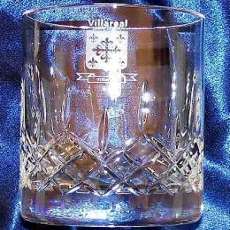
Gorgeous
Glistening Galway Crystal

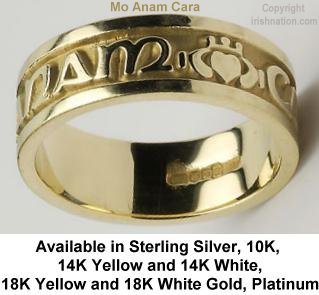
From US$69 Delivered

BIG REDUCTIONS!
Stunning Engraved Rings from Ireland with Irish Language Phrases.
Mo Anam Cara:
My Soul Mate
Gra Dilseacht Cairdeas:
Love, Loyalty, Friendship
Gra Go Deo:
Love Forever
Gra Geal Mo Chroi:
Bright Love of my Heart
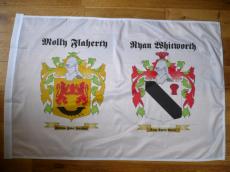
Family Crest Flags, Ireland Flags, Wedding Flags, Four-Province Flags, Erin Go Bragh Flags. Great Selection.

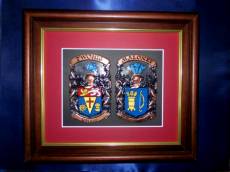
Incredible Family Crest Plaques Made in Ireland

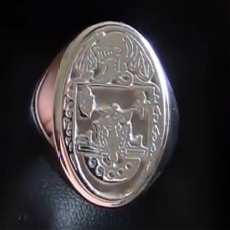
BIG REDUCTIONS!
Stunning Family Crest
Signet and Seal Rings

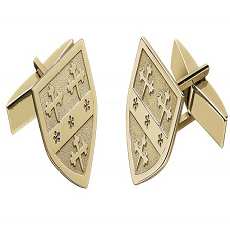
DISCOUNTED FOR A LIMITED TIME
Elegant Cufflinks

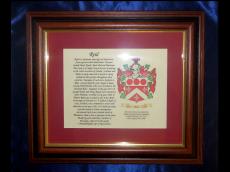
Superior Framed
Family Crest Parchments

'Your-Name' Old Irish Sign
NEW DESIGNS!
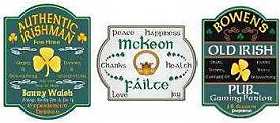
From US$34.99 - Free Delivery


Personalized Licence Plate


Personalized First Name Plaque. Great for Kids!


New Designs available
on our Coffee Mugs

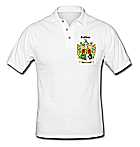
'Your-Name'
Polo & Tee Shirts

SEE MORE GREAT OFFERS AND DISCOUNTS AT:
IRISHNATION.COM
FREE DELIVERY FOR A LIMITED TIME!
|
|
|
unsubscribe/disconnect from Ireland here
|
|
| |











